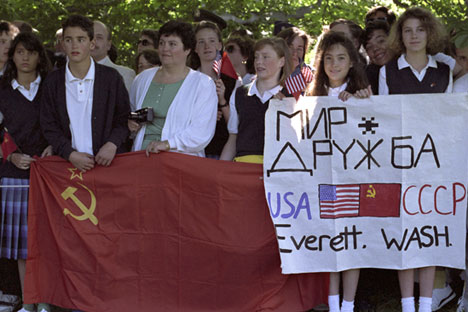Press Digest: Swiss banks launch mass closure of Russian bank accounts

Swiss bank Credit Suisse logo is seen in front of its headquarters in Zurich. Source: Reuters
ReutersSwiss banks closing accounts of Russian citizens
The largest Swiss banks, UBS and Credit Suisse, have begun to close en masse savings accounts held by Russian clients, writes Forbes Russia, citing its own sources.
“Banks are forcing clients to close any accounts with less than $5 million on deposit,” said one banker. “If a client refuses to do so, the bank demands payment of a monthly fee – for account maintenance, which is around one thousand francs per month.”
Many costumers received some unpleasant surprises, because the banks sent notifications out by regular mail.
“Many Russian customers were sent special paper notices to their rented mailboxes in Switzerland,” says the banker. “Of course, these boxes are rarely checked, and thus many customers learned about their bank’s decision only three or four months after the notices were sent out, and thus were forced to pay the service fees.”
UBS does not charge any punitive tariffs to owners of small accounts, said Ilya Solaryev, head of UBS Wealth Management in Russia.
“UBS clients have benchmarks, in terms of amount of assets owned, which makes it economically feasible to use the bank’s entire spectrum of banking services,” said Solaryev. At UBS, the minimum landmark is $5 million. Credit Suisse responded that their bank “does not publically discuss issues related to their customers.”
Russians started having problems with foreign banks already in the spring of last year when Russia came under international sanctions for its seizure of Crimea.
A Russian developer who has a business abroad told Forbes that the closure of small accounts held by Russians abroad has become commonplace and that he believed it was because banks were taking a cautious approach in view of the U.S. sanctions against Russia.
Russian and American weapons being drawn into conflict
The confrontation in Syria is becoming increasingly fierce, reports the business daily Kommersant. In response to the offensive launched by government troops, being supported by Russian air attacks, Washington has approved the supply of U.S. anti-tank systems to the Syrian opposition, which are being sent to the country through regional allies.
According to Ruslan Pukhov, director of the Center for Analysis of Strategies and Technologies, such a move would lead to the emergence of a proxy war in Syria – between Russia and the United States.
“The Obama administration understands that such supplies are not only perceived by Moscow as a serious challenge to Russia, and a personal challenge to President Putin, but could damage the security of the United States itself, if these MANPADS [shoulder-mounted rocket launchers] should fall into the hands of America’s enemies,” explained Pukhov.
“We are stressing one thing to them – you, in arming the more moderate opposition groups, will never be able to give assurances that such weapons, as well as the people trained to use them, will not end up on the side of the terrorist organizations. There is no certainty that the MANPADS, about which the Western media is now writing, will not fall into the hands of those for whom they were not intended for,” said Maria Zakharova, spokesperson for the Russian Foreign Ministry.
Raw materials alone no longer enough for strategic partnership with China
The traditional model of Russian-Chinese trade is becoming obsolete, writes the centrist daily Nezavisimaya Gazeta.
Trade turnover between the two countries is rapidly declining – in 2015 it fell by almost 30 percent. While under the traditional model, two thirds of Russia’s exports were composed of raw materials, now the new model calls for the export of finished products, as well as participation in joint high-tech projects.
According to Alexei Maslov, chief of Oriental Studies Department in the Higher School of Economics, “China now has a choice of many alternative partners.”
“In the gas sector, our competitors in China are Kazakhstan and Turkmenistan, in the oil sector – the Gulf countries and Kazakhstan. That is, Russia has ceased to be, in this situation, the most important partner,” said Maslov, who explained that the way out of this situation is to move towards cooperation in the high-tech sphere and at the level of joint projects.
China, for its part, is proposing that Russia accelerate work on the construction of road and railway bridges in the border areas.
“We need cross-border infrastructure. How can you increase the volume of turnover if many border crossings are seasonal in nature, where pontoon ferries are used to carry cargo during the navigation season, and in the winter, the border crossings remain idle?” asked Lu Hao, chairman of the People’s Government of Heilongjiang Province on Oct. 12, during the opening of the Russian-Chinese Expo in the northern Chinese city of Harbin.
All rights reserved by Rossiyskaya Gazeta.
Subscribe
to our newsletter!
Get the week's best stories straight to your inbox

